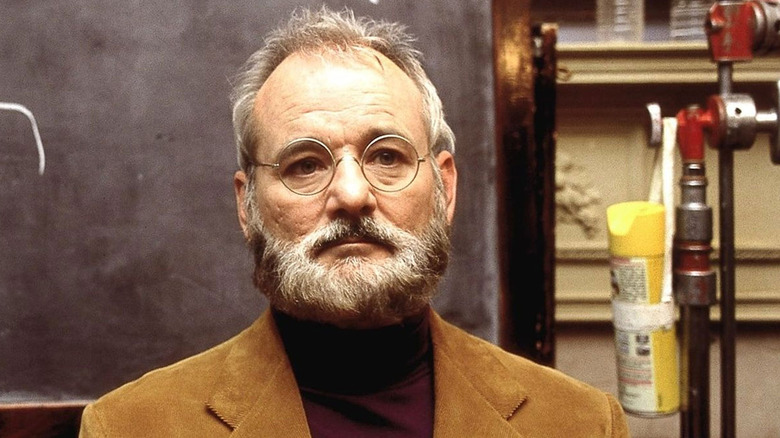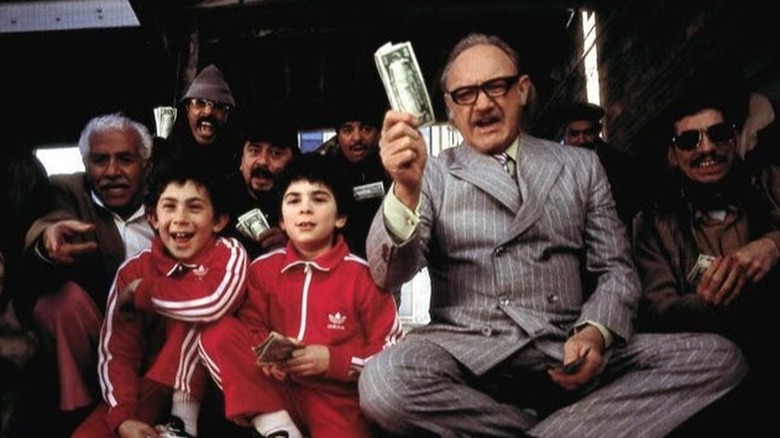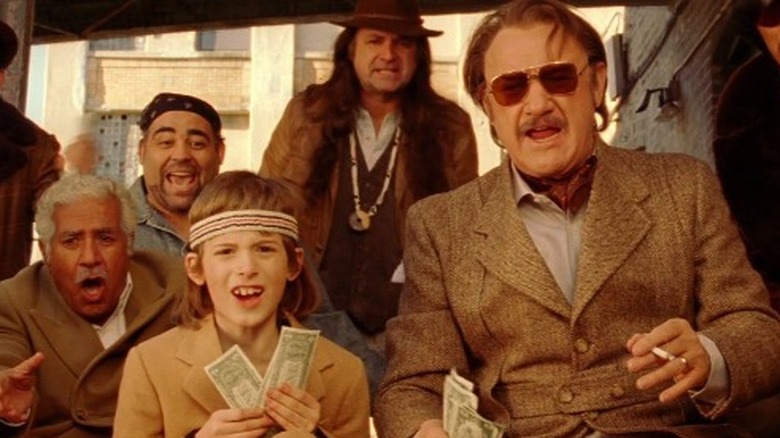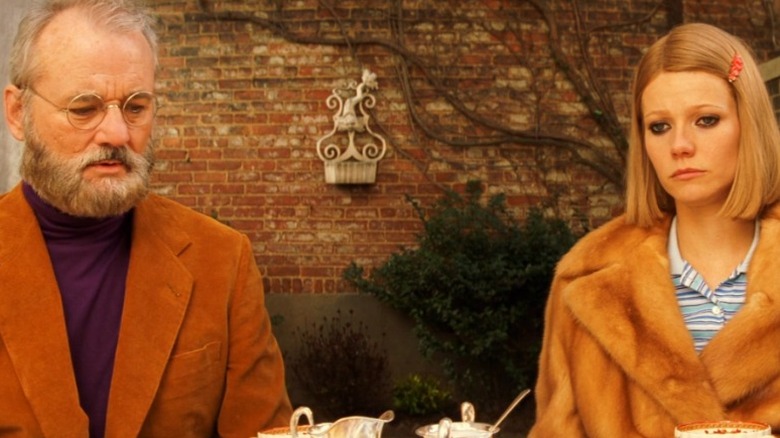Bill Murray Had A Surprising Second Role On The Royal Tenenbaums Set
Wes Anderson makes movies about families. From the way his stories deal with found families and haunted father figures, to the real-life closeness he likes to foster by regularly casting long-time collaborators, he's an artist who cares about relationships on-and-off-set. As he told the New York Times in 2021, "[what] I like to do is go to a place and ... become like a little theater company." Given Anderson's distinctive style, his cast always leaves a big impression. And no actor has been in more Wes Anderson movies than Bill Murray.
During the production of his second film, "Rushmore," Anderson found something special in the actor, a particular deadpan quality that meshes perfectly with the Anderson aesthetic. Since then, Murray has been in every one of Anderson's films (and gave away the title of his upcoming film "Asteroid City"). Early in their collaboration, Murray demonstrated the strength of his friendship by helping Anderson with a particularly tough actor: Gene Hackman in 2001's "The Royal Tenenbaums."
With "Tenenbaums," Anderson created one of cinema's great dysfunctional families, setting their various neuroses against an old-world, old-money backdrop. At the center of this is the family's patriarch, the titular Royal Tenenbaum (Gene Hackman). Royal screams, manipulates his children, and is openly racist to Henry (Danny Glover), his ex-wife's accountant and fiancé. Royal doesn't have many scenes with neurologist son-in-law Raleigh St. Clair (Bill Murray), but the two actors did interact — Murray did do his best to protect the young director from Hackman's alleged rages.
Hackman as Royal
The way Hackman, the intense and notorious actor who played the lead in Francis Ford Coppola's maybe-best film, behaved during production of "The Royal Tenenbaums" was a far cry from the loving environment Anderson likes to build.
Speaking with Matt Zoller Seitz for his book, "The Wes Anderson Collection," Anderson would claim that the role of Royal was written for Hackman "against his wishes." According to Anderson at the movie's 10th anniversary chat at the 2011 New York Film Festival, Hackman took about a year and a half to agree to the movie. At that event, Anderson and his actors recalled many stories of Hackman, who would get angry on set and tell Anderson to pull up his pants and "act like a man." A 2001 New York Times Hackman profile notes that the actor has "a reputation for chewing up directors," and Anderson was certainly among them. That same profile has Hackman discussing the tension between him and the rest of the "Royal Tenenbaums" cast.
A great Wes Anderson film comes from the clash between naked human emotion and pristine, porcelain production design, and that same tension was also threatening to tear "Royal Tenenbaums" apart.
While on a panel during the 2021 Tribeca Festival, Anderson suggested that part of Hackman's rising temper came from the small paycheck he got for doing a mid-budget film. Shortly after shooting was done, Hackman was in a public fistfight (at 71) with a stranger following a car accident. No matter the reason for Hackman's behavior, he has since become the center of many of the cast's recollections around the movie.
Defending Wes
The "Tenenbaums" cast felt protective around Anderson, whose soft-spoken demeanor made him something of an easy target for Hackman's outbursts.
By the late '90's, enough Hackman stories had gone around that his co-stars like Gwyneth Paltrow or Anjelica Huston recalled being afraid of him before filming began. At the NYFF screening, Huston, in the role of Royal's ex-wife Etheline, claimed to be scared of Hackman but "more concerned with protecting Wes." During an argument scene between Ethel and Royal, Huston had to slap Hackman, and she made it count, getting a genuine "goddamn" out of the veteran actor.
Also at the NYFF chat was Bill Murray, who recalled his own experiences with Hackman on set. Even though the two shared few scenes, Murray was one of the few actors who didn't seem to fear Hackman. He responded to his irascible co-star's threats with humor, noting that there was only so much truth to Hackman's threats:
"I'd hear all these stories [like], 'Gene threatened to kill me today.' Kill you? You're in the union, he can't kill you. 'Gene threatened to set fire to all of us.' [I'd say], it's a union shoot! He can't set anyone on fire!"
While Hackman's on-set reputation was negative, he couldn't help but be otherwise professional, showing up on set day-in and day-out, even on days when he wasn't called. Anderson would go on to ask Murray to show up as well.
Murray on set
With Murray on-set to defend Anderson from Hackman, there was an extra degree of security. One particular recollection of Anderson's involved filming a scene with Royal walking in the park. While filming Hackman's walk, Anderson looked up, and saw Murray overlooking the whole of the scene in a cowboy hat, in an image that feels ripped from a Wes Anderson movie.
Hackman's notorious behavior on-set continues to be the subject of the cast's recollections around the movie, as does Murray's protectiveness around Anderson. As Murray noted in the NYFF conversation, he was able to keep things on the level by looking for vulnerability from the older actor, saying, "when you challenge someone like Gene, you find his weakness."
In exchange for Hackman's belligerent behavior onset, the director received a brilliant performance, probably the most bitter and hard-edged in any of his movies. That Hackman barely deigned to even try to fit in with the Anderson troupe works out for the better, as Royal struggles to communicate with his kids and his ex-wife, lashing out almost as a matter of default. His work is funny, deft, and honest, giving the same kind of poignant outsider performance that Bruce Willis would give in "Moonrise Kingdom" over a decade later.
Meanwhile, Murray showed a willingness to go beyond the demands of the script, by putting in extra work to keep the production copacetic.



